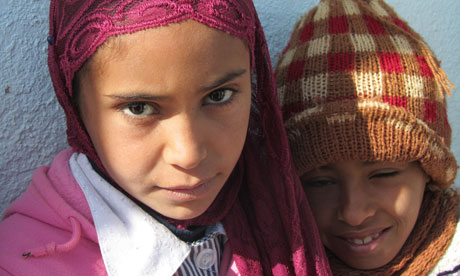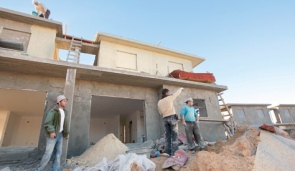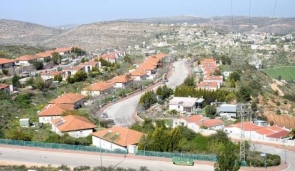Israel demolishes homes and classroom in West Bank village
 Saturday, January 15, 2011 at 08:51PM
Saturday, January 15, 2011 at 08:51PM By Harriet Sherwood
14 January 2011
Children taught outdoors after bulldozers reduce unauthorised buildings to rubble

In a bleak but beautiful landscape of undulating stony hills I watched a group of Palestinian schoolchildren take their lessons yesterday in the open air next to a heap of rubble that, until this week, was their classroom.
This is the village of Dkaika, about as far south in the West Bank as you can get. It's a community of around 300 people, without electricity or running water, whose days are spent tending their herds of goats and sheep and trying not to attract the attention of nearby Jewish settlers.
On Wednesday, at about 7.30am, a convoy of military vehicles and bulldozers arrived to tear down 16 homes, an animal pen, a store and one of the village school's classrooms. All were subject to demolition orders, granted because the structures were built without permission, which is almost impossible for Palestinians to get around here. Dkaika is in Area C, under full Israeli military and civil control, which accounts for 60% of the West Bank.
At the time there were dozens of children inside the school. The soldiers tried to prevent the its three teachers from entering the building. Sulaima Najadah, 38, who has taught English at the school since last September, told me that he sneaked in to reassure the crying children.
"I was in this class," he said, pointing to the pile of twisted metal and masonry. "The soldiers took us out by force."
The teachers were handcuffed and blindfolded in front of their pupils before the bulldozers moved in. One girl, Mariam Odeh, 13, said she had been afraid the classroom would be demolished over their heads.
Twelve-year-old Nayfeh Ka'abneh lost her home as well as her classroom. That night she slept in a tent. "It wasn't comfortable," she said, shyly twisting the ends of her headscarf. "We want to rebuild our home."
In another tent, with a rug laid over bare stony ground and a small fire burning in a corner, Fida Najada, 24, said she had no money to reconstruct her home. Her husband, who was tending herds far from the village, did not yet know it had been demolished. Pregnant and with a small boy clinging to her legs, Najada had no idea how long she would have to live under canvas.
Between 50 and 60 people were made homeless by Wednesday's demolitions, adding to the 478 - many of them children - displaced in Area C in 2010, according to figures from the UN's Office for the Coordination of Humanitarian Affairs (OCHA). The number for the previous year was 319.
Residents had believed the demolition orders were on hold while a plan to regularise the village was considered by the Israeli authorities.
They did not deny that buildings were erected without permission. Palestinian building is rarely approved in Area C, in contrast to permits for settlement expansion.
The area has been inhabited by Palestinians since the Ottoman era, locals said. Its population swelled when families moved across the Green Line from the Negev after the war in 1948.
A spokesman for the Israeli military told me yesterday afternoon he would make inquiries about the demolitions. I will post any comment from the IDF on the thread below when it comes through.
----------------------------------------------------------------------------------------------------------
and, as a contrast:
Netanyahu forbids demolition of illegal West Bank homes of slain IDF soldiers
Barak says that unless a legal solution is found, the state will have to tear down the houses of Eliraz Peretz and Roi Klein.
By Chaim Levinson
14 January 2011
Prime Minister Benjamin Netanyahu said Thursday he would not allow the illegally built homes of two Israeli soldiers killed in action to be demolished. Both houses were built on illegal outposts in the West Bank, one on private Palestinian land.
Defense Minister Ehud Barak said that unless a legal solution is found, the state will have to tear down the houses of the two soldiers, Eliraz Peretz and Roi Klein.
 Illegal construction in the Neveh Shoham neighborhood of the Eli settlement in the West Bank.
Illegal construction in the Neveh Shoham neighborhood of the Eli settlement in the West Bank.
"I won't let those houses be destroyed," Netanyahu said at a Manufacturers Association gathering in Tel Aviv. "I think it's a moral duty we have to those two heroes and their families. It's a matter of common sense, there's a public debt and it won't happen."
The state was due to tell the High Court of Justice Thursday of its plans on the houses' demolition. But at Netanyahu's request the prosecution asked the court to postpone the state's reply by a month, giving it time to find a solution.
In 2005, Peace Now petitioned the High Court of Justice, demanding the demolition of 12 illegally built houses in the Givat Hayovel outpost. In November that year the court ordered the state to explain why the houses should not be torn down.
 The illegal outpost of Givat Hayovel
The illegal outpost of Givat Hayovel
After three years of stalling, the state said the houses would be demolished, subject to priorities. In July 2009 the court said it intended to issue a demolition order, but put this off to enable a hearing for the residents.
Meanwhile, Peretz was killed in Gaza and the state asked to reexamine the land's status. It found that two of the outpost's houses, including Peretz's, were built on private Palestinian land. The others, including Klein's house, were on state land.
Last week the Defense Ministry and State Prosecution tried to develop the state's position for the court. Barak said a legal solution should be found to legitimize Peretz's house, but if none was found, the house should be demolished.
One suggestion last week was to tear down the house, inhabited by Peretz's widow, and rebuild it in the nearby settlement of Eli so it would be located on state-owned land.
But Eli has no master plan, so every construction change there is illegal. The settlement is located on large areas of private Palestinian land and exceeds its originally allocated area. This means many changes, including moving buildings, are required before a master plan can be drawn up and approved.
Another obstacle is a cabinet decision made during Netanyahu's first government that establishing a new settlement requires a cabinet decision. Givat Hayovel was set up without a cabinet decision. Legal experts disagree on whether it is considered an outpost near Eli and is included in the decision to build Eli, or requires a new cabinet decision to legitimize it.
Another possible way out is to give the owner of the land under Peretz's house alternative land. But the state does not know who owns the land and has no one to negotiate the transaction with.
The Ministerial Committee for Legislation is expected to discuss a bill next week forbidding the state from tearing down houses in West Bank settlements without the approval of the Knesset's Foreign Affairs and Defense Committee.
Sponsored by MK Carmel Shama-Hacohen (Likud), the bill will apply to existing demolition orders as well. The defense minister has exclusive authority to demolish settlers' illegal homes in the West Bank. The bill is intended to give this authority to the Knesset committee.
----------------------------------------------------------------------------------------------------
More on this topic
State to High Court: We'll authorize illegal West Bank outpost
PA seeks UN vote next week on resolution condemning West Bank settlements
 APJP |
APJP |  Post a Comment |
Post a Comment |